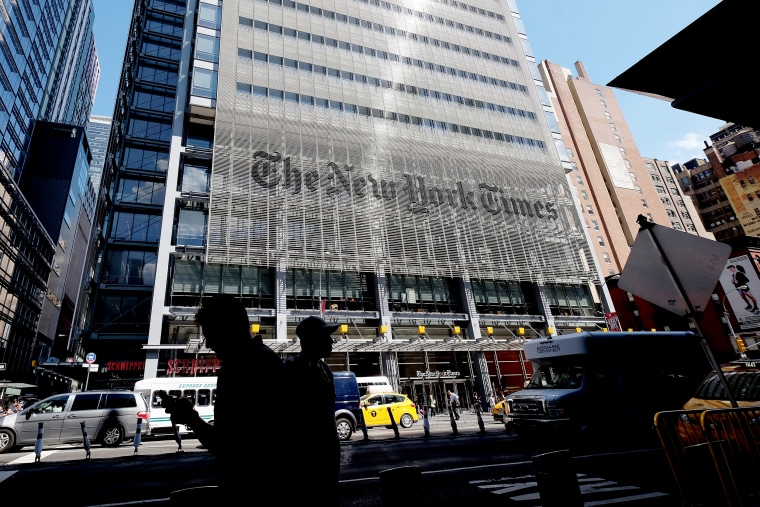The New York Times provoked intense criticism Thursday for publishing personal details about the whistleblower at the center of the impeachment inquiry against President Donald Trump, with some critics saying the decision could put the person in jeopardy.
The Times article, published Thursday afternoon, specified the whistleblower's profession and employer, citing three unnamed sources familiar with his identity. NBC News is not reprinting the details of the article because the whistleblower is seeking anonymity.
"It is absolutely horrifying that The New York Times thought this would serve the public interest," Nick Shapiro, former deputy chief of staff and senior adviser to ex-CIA Director John Brennan, told NBC News.
Shapiro, who was one of many former government officials and media commentators who criticized The Times on Twitter, added that the article could deter other whistleblowers from coming forward with potentially damaging information about the administration.
"This whistleblower, who deserves to be protected, put the country first, went through all the proper channels to do this the right way," Shapiro said. "This will send a chilling message to everyone else."
In a tweet, Ben Rhodes — a deputy national security adviser under President Barack Obama and an MSNBC contributor — struck a similar chord, arguing that the Times article puts the author of the complaint "at risk" and "disincentives" those who might want to follow his lead.
"The Times regularly grants more anonymity to Trump aides who lie about mundane things," Rhodes said in a separate tweet. "The whistle blower is being denied that discretion because he went through proper legal channels on a matter of national security."
But Clint Watts, a fellow at the Foreign Policy Research Institution and an NBC News contributor, was less critical of the newspaper's decision.
He said that while he believes the identities of all whistleblowers should be safeguarded, he thought some of the criticism of The Times, especially on Twitter, was overblown, since the newspaper did not identify the whistleblower by name.
It also stands to reason that the Trump administration could deduce the identity of the author of the complaint without the help of journalists at the Times, Watts added.
The article itself contained a defense of the paper's journalistic judgment from executive editor Dean Baquet:
"The role of the whistle-blower, including his credibility and his place in the government, is essential to understanding one of the most important issues facing the country — whether the president of the United States abused power and whether the White House covered it up."
In response to critics, Baquet issued a statement later Thursday saying the paper "decided to publish limited information about the whistleblower ... because we wanted to provide information to readers that allows them to make their own judgments about whether or not he is credible."
Baquet said that questions about the whistleblower's credibility had been raised by Trump and "some of his supporters," noting that the president has called the complaint "a political hack job."
A spokesperson for the Times directed NBC News to Baquet's statement. Later on Thursday the Times published a new article reporting that some details about the whistleblower may have already been known by the White House after it was notified of the complaint.
The original article was published not long after reports emerged that Trump likened those who provided information to the whistleblower to spies. Those statements have been confirmed by NBC News.
Trump told a private group at a New York hotel Thursday morning that the people who gave information to the whistleblower were "close to a spy," adding that the U.S. should "handle" them like it did "in the old days" — an apparent allusion to the execution of people caught committing espionage. The U.S. executed Julius and Ethel Rosenberg in 1953 after finding them guilty of conspiracy to commit espionage.
The whistleblower lodged a formal complaint about the president's phone call in July with Ukrainian President Volodymyr Zelenskiy in which he asked his foreign counterpart to probe why that country's top prosecutor apparently ended an investigation into the business dealings of Joe Biden's son, Hunter Biden.
The matter is now the subject of a formal impeachment inquiry that was launched this week by the House of Representatives. The whistleblower, whose complaint was released with minimal redactions Thursday by the House Intelligence Committee, wrote it out of a belief that Trump was "using the power of his office to solicit interference from a foreign country in the 2020 election."
Kelly Magsamen, the vice president for national security and international policy at the Center for American Progress, a left-leaning think tank, said the information published by the Times could make it easier for the White House to track him down.
"There are records of employment," Magsamen said in an email. "Now Trump and his staff will easily be able to narrow the identity of that whistleblower down. It's chilling to all national security professionals who have served or who currently serve on the staff" of the National Security Council.
Jack Shafer, a veteran media critic who writes a column for Politico, appeared to defend the Times' decision, writing on Twitter: "Where is it written that the press' job is to protect the identity of official whistleblowers?" The tweet was accompanied by a screenshot of a quote from an 1852 edition of the British newspaper The Times about the "first duty of the press."
Margaret Sullivan, a media columnist at The Washington Post and a former public editor of The Times, joked on Twitter that the Times initiative that allows readers of the newspaper to submit questions and feedback was probably being inundated.
"Busy day for the NYT Reader Center, I'm guessing," Sullivan wrote.

